© 2024 ClueLoop Associates, LP. All rights reserved.
Business
Biggest Challenges Black Entrepreneurs Face in the UK

9 minutes read
Difficulty in raising finance
The British Business Bank’s report, “Alone Together: Entrepreneurship and Diversity in the UK,” highlights the financial challenges faced by Black business owners, who are significantly less likely to secure funding from traditional lenders.
Only 39% of Black entrepreneurs have their loan applications approved, compared to 67% of White entrepreneurs. Additionally, those who do receive loans often face higher interest rates and less favourable terms, further limiting their financial opportunities. (British Business Bank, 2020).
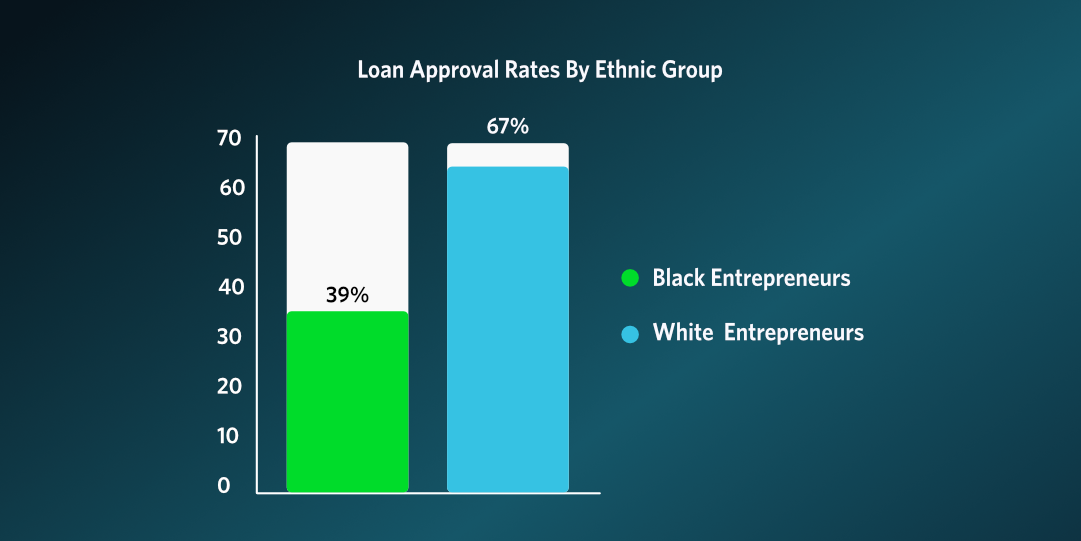
Limited network
Strong networks are essential for business success, offering access to resources, information, and growth opportunities. However, Black business owners often face limited access to influential networks. This challenge is rooted in historical and systemic exclusion from key professional and social circles where vital business relationships are built. As a result, they miss out on valuable opportunities for partnerships, collaborations, and referrals—factors that could significantly enhance their business growth and success.
The Federation of Small Businesses (FSB) report, “Unlocking Opportunity: The Value of Ethnic Minority Businesses to UK Economic Activity and Enterprise,” emphasizes that Black business owners face limited opportunities to connect with mentors, peers, and potential business partners.
Lack of supportive mentors and professional support
The lack of mentors who understand the unique challenges faced by Black entrepreneurs and can offer culturally relevant guidance makes it harder for them to navigate the complexities of business ownership. Additionally, the limited availability of professional support services tailored to their specific needs further impedes their chances of success.
Black entrepreneurs often seek business advice within their own community, which may restrict growth and productivity. Instead of turning to traditional financial institutions, they primarily rely on friends (31%), Black business community groups or social media groups (both 29%), while only 12% seek advice from banks.

Lower net worth and property ownership
Wealth disparities remain stark within the Black community, with significantly lower net worth and property ownership compared to other groups. This economic disadvantage limits access to capital, as Black entrepreneurs often lack the collateral required to secure loans and investments. Without substantial personal savings or family wealth, many struggle to fund their business ventures and must rely on external financing—which is often difficult to obtain.
Data from IPPR (2020) reveals that:
- The average net worth of Black households is £24,000, compared to £197,000 for White British households.
- Only 20% of Black households own their homes, whereas 68% of White British households do.
These disparities stem from historical and systemic inequalities, continuing to impact financial stability and economic opportunities for Black individuals and families in the UK.
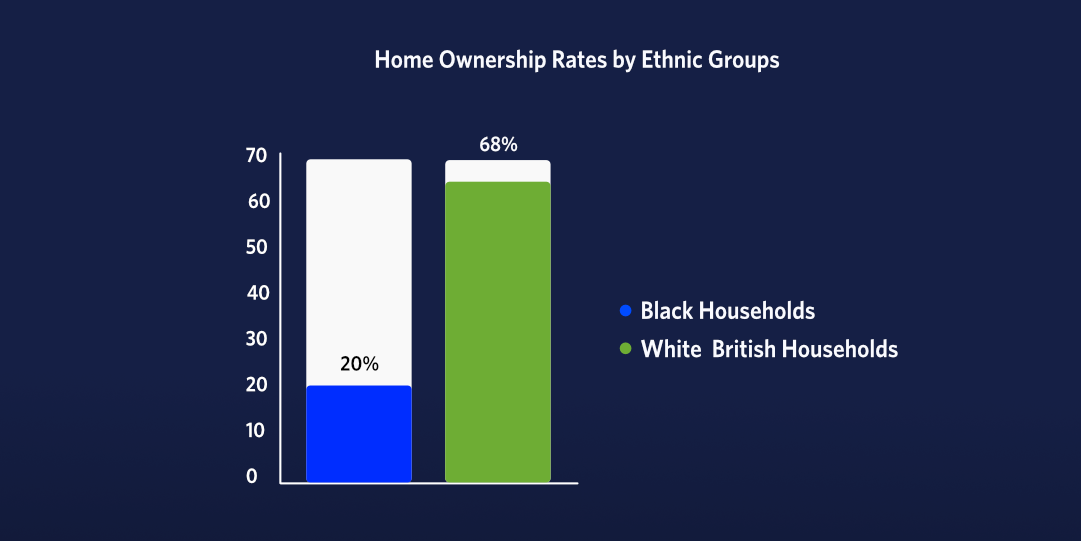
Limited experience in higher employment positions
Gaining professional experience in senior roles is essential for developing the skills needed for successful business ownership, including strategic management, business operations, and leadership. However, Black professionals are significantly underrepresented in senior positions across the UK corporate sector, limiting their opportunities to acquire this critical experience.
The Parker Review 2022 update highlights the ongoing lack of Black representation in leadership:
- Only 3% of FTSE 100 board positions are held by Black directors.
- This underrepresentation extends across multiple sectors, including finance, technology, and public services.
Despite some progress, Black professionals continue to face barriers to executive and non-executive roles, reinforcing structural inequalities that make business ownership more challenging.
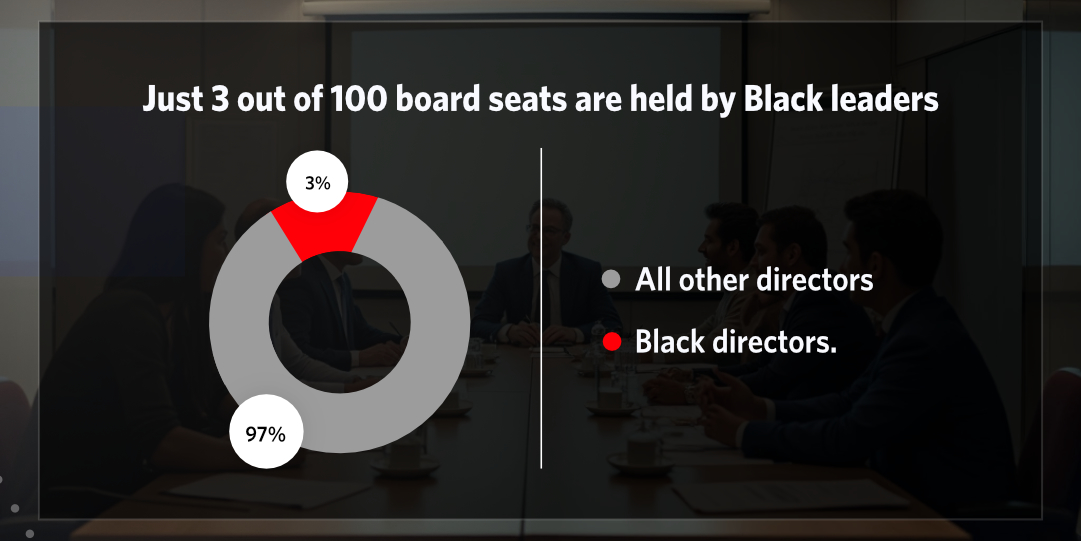
Consumer rather than producer mindset
Historically, cultural and economic factors have positioned Black individuals more as consumers than producers. This consumer-oriented mindset can limit entrepreneurial aspirations and hinder the development of business acumen. Shifting this perspective is crucial to fostering a culture of entrepreneurship within the Black community, encouraging more individuals to start and scale businesses.
The Black Lives Matter & Black Pound Day Consumer Report by Jamii & Translate Culture serves as a valuable resource, offering key insights into the experiences of Black-owned businesses in the UK. This comprehensive study highlights both the challenges and opportunities within the UK’s business landscape, revealing the untapped potential of Black entrepreneurs to contribute more significantly to the economy.
According to the report, the Black British community has a spending power of £300 billion, yet only 2% of this is spent within Black-owned businesses. This significant disparity underscores the need for greater investment in Black businesses and the development of stronger support networks to drive economic empowerment.
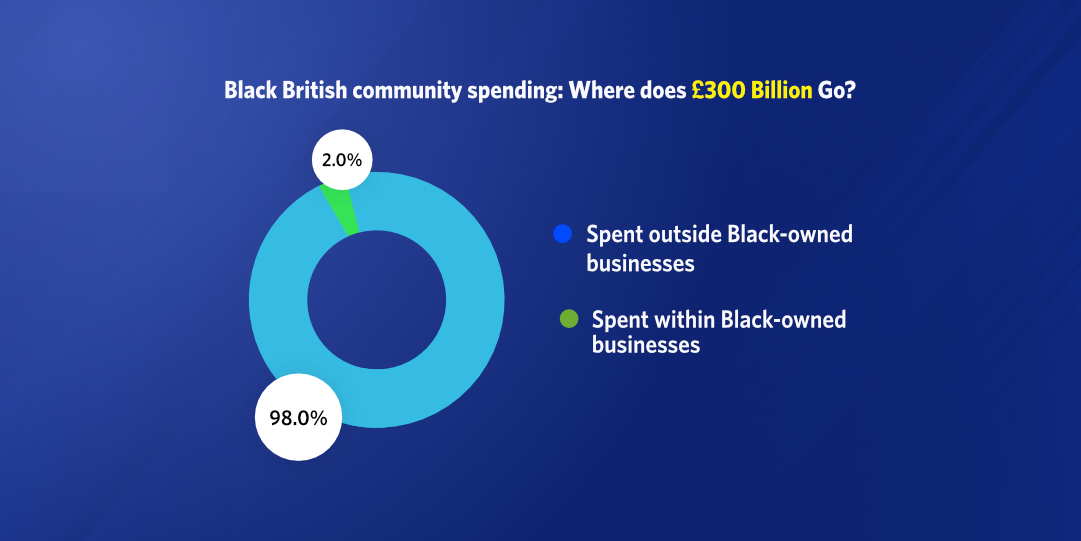
Businesses in non-scalable areas
Black entrepreneurs often establish businesses in less scalable sectors, such as small retail and personal services, which typically have lower growth potential and profit margins. To drive sustainable economic growth and greater community impact, increasing participation in scalable industries like technology, manufacturing, and innovative services is essential.
The Aston University CRÈME report reveals that ethnic minorities in the UK tend to be more entrepreneurial than the general population. However, they are less likely to operate mature, well-established firms that provide stable income.
The contrast is particularly stark between White and Black business owners:
- 67% of White entrepreneurs run businesses older than 42 months (considered established).
- In contrast, only 43% of Black entrepreneurs operate businesses that have reached this level of stability.
This gap highlights the need for greater access to growth opportunities, industry diversification, and long-term business support for Black entrepreneurs.
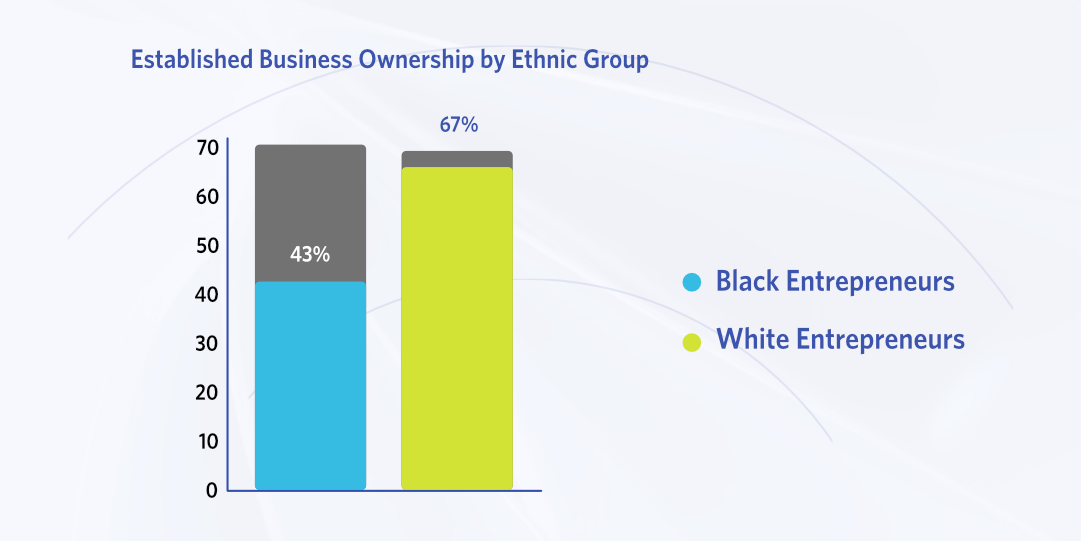
Discrimination and bias
Black entrepreneurs frequently encounter both explicit and implicit bias, which can impact their interactions with customers, suppliers, and financial institutions. Discrimination appears in various forms, ranging from prejudiced attitudes in business dealings to systemic barriers within financial services, creating obstacles that can discourage growth and limit opportunities for Black-owned businesses.
The UK Government’s Race Disparity Audit highlights significant inequalities in employment and business opportunities for Black and ethnic minority individuals. The audit found that Black business owners are more likely to experience discrimination when seeking finance, contracts, and business support services, compared to their White counterparts. These disparities underscore the urgent need for more equitable access to resources and opportunities to support Black entrepreneurs in achieving long-term success.
Limited access to information
Black business owners often face limited access to essential business information and resources, which are crucial for making informed decisions. This includes insights into market trends, funding opportunities, and regulatory requirements. Without this critical knowledge, Black entrepreneurs may struggle to compete effectively and navigate the complexities of the business landscape.
The Centre for Research in Ethnic Minority Entrepreneurship (CREME) report, “The Barriers to BAME Entrepreneurship,” highlights that Black and minority ethnic entrepreneurs frequently lack access to vital business information. This gap in knowledge can hinder growth, limit funding access, and create additional challenges in building sustainable businesses. Bridging this information divide is essential for fostering a more inclusive and equitable entrepreneurial ecosystem.
Cultural barriers
Cultural misunderstandings and stereotypes present significant obstacles for Black entrepreneurs within the broader business community. These challenges can influence customer perceptions, impact employee relations, and limit partnership opportunities. Overcoming these barriers requires a strong commitment to diversity and inclusion, fostering an environment where all entrepreneurs can succeed.
The Institute of Leadership & Management’s report, “Inclusion and Diversity in the UK Workplace,” identifies cultural biases as major challenges for Black business owners. These barriers can lead to miscommunication, reduced trust, and restricted access to business opportunities.
Addressing these challenges demands a multi-faceted approach, including:
- Policy reforms to create a more inclusive business environment.
- Increased access to finance for Black entrepreneurs.
- Mentorship programs to provide guidance and support.
- Greater integration into broader business networks.
By recognizing these barriers and actively working to remove them, we can create a more inclusive, equitable, and dynamic business landscape—one that benefits not just Black entrepreneurs but the UK economy as a whole.
Despite the challenges, there are notable successes among minority entrepreneurs in the UK’s business landscape. A report sponsored by EY highlights that eight of the UK’s 23 tech unicorns—private startups valued at $1 billion (£740 million) or more—were co-founded by minority entrepreneurs.
Additionally, 23 of the UK’s top 100 fastest-growing companies in 2019 were founded or co-founded by minority entrepreneurs, including Bulb Energy, which ranked No. 1. These achievements demonstrate the immense potential within underrepresented communities and the impact of diverse leadership in driving innovation and economic growth.
Stay Informed
Sign up to receive our latest research on the forces shaping global economies and markets.

